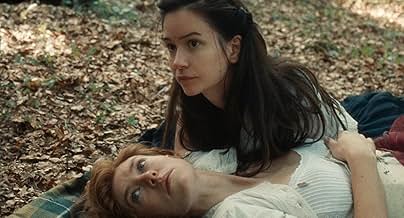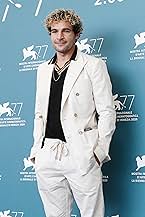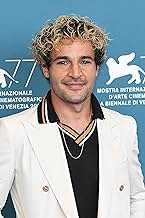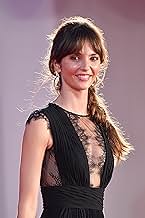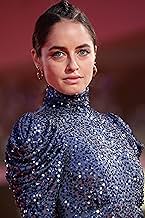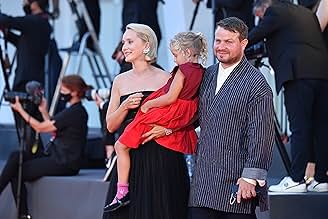Zwei benachbarte Paare kämpfen in einer herrlichen, aber auch schwierigen Landschaft gegen Not und Isolation und fordern sie sowohl physisch als auch psychisch heraus.Zwei benachbarte Paare kämpfen in einer herrlichen, aber auch schwierigen Landschaft gegen Not und Isolation und fordern sie sowohl physisch als auch psychisch heraus.Zwei benachbarte Paare kämpfen in einer herrlichen, aber auch schwierigen Landschaft gegen Not und Isolation und fordern sie sowohl physisch als auch psychisch heraus.
- Auszeichnungen
- 5 Gewinne & 8 Nominierungen insgesamt
Karina Ziana Gherasim
- Nellie
- (as Karina Gherasim)
Ioachim Ciobanu
- Widow Weldon's Son
- (as Kim Ciobanu)
Sandra Personnic-House
- Mrs. Nottoway
- (as Sandra J House)
Empfohlene Bewertungen
On the surface this might seem to be a story about two repressed lesbians, but it is so much more than that. It is hard for us today to relate to how it was in the mid 1800s. A man married a woman so she could give him children, she could do daily chores, like milk the cow and feed the pigs and chickens. They had none of the conveniences we take for granted, any entertainment had to come from within.
This is a story spanning about the first nine months of the year 1856. Of two young couples, each working nearby farms. One had a 4-yr-old child that became sick and died. The other couple were unable to have children and the man blamed it on his wife.
So although each wife was attractive, capable, and smart the husbands came to be less and less happy with them. The two young wives found happiness being with each other, sharing thoughts and emotions they could not with their husbands. A way to bring some light into their dreary days.
Yes, when it was all done one might say they were lesbians. Or maybe they were just forced into an attraction and hidden relationship that was their only choice in this bleak existence. No matter it is a good movie and I prefer to look at it as making the best of your situation.
On DVD from my public library, my wife chose to skip.
This is a story spanning about the first nine months of the year 1856. Of two young couples, each working nearby farms. One had a 4-yr-old child that became sick and died. The other couple were unable to have children and the man blamed it on his wife.
So although each wife was attractive, capable, and smart the husbands came to be less and less happy with them. The two young wives found happiness being with each other, sharing thoughts and emotions they could not with their husbands. A way to bring some light into their dreary days.
Yes, when it was all done one might say they were lesbians. Or maybe they were just forced into an attraction and hidden relationship that was their only choice in this bleak existence. No matter it is a good movie and I prefer to look at it as making the best of your situation.
On DVD from my public library, my wife chose to skip.
Against the warmest 19th century colour, when being yourself was forbidden, a relationship begins but is thwarted, with fossil control and dominance reinstated. Two great performances from Katherine Waterstone and Vanessa Kirby amplified through the acute and sensitive direction of Mona Fastvold.
The World To Come: Life was bleak and hard in 1856 in Upstate New York, rocky fields, sheep, (could be Connemara), chickens. Life was lonely for women, but here a relationship develops between two women which goes beyond friendship. Tragedy results but the unfolding of the narrative is moving. A tale of love, separation, hardship, patriarchy and it's discontents. Directed by Mona Fastvold from a Screenplay by Ron Hansen and Jim Shepard. 8/10.
Greetings again from the darkness. I'd be hard-pressed to name a movie that is more somber, front beginning to end, than this film from director Mona Fastvold (writer of VOX Lux, 2018) and co-writers Ron Hansen (THE ASSASSINATION OF JESSE JAMES BY THE COWARD ROBERT FORD, 2017) and Jim Shepard (based on his short story). Allowing only a few sparks of hope in the second act, the film's ending finds us nearly as beaten down as the four main characters we've just watched.
Structured as though Abigail (Katherine Waterston) is reading her own journal entries as they play out in real life, the film captures the brutal conditions of working a hillside farm in upstate New York during 1856. But more than that, it conveys the price of a joyless existence on the frontier, when days were spent adhering to chores. For everyone, this meant little social interaction; and for women this meant cooking, cleaning, and giving birth. Abigail mesmerizes with her balletic poetry in describing the drudgery of her life and marriage to Dyer (Casey Affleck). Dyer is a sullen man who says little, but remains dutiful in his responsibilities. He is attuned enough to allow Abigail her space after diphtheria claims their young daughter ... though he seems mostly unchanged by the tragedy.
Abigail's emptiness and unrequited quest for meaning seem her destiny until the day that new arrivals rent the next farm over. As Finney (Christopher Abbott) guides the wagon by, Abigail and Tallie (Vanessa Kirby) lock eyes, signaling to them (and us) that life on the frontier is about to become more exciting than collecting that day's eggs from the chicken coup. This moment arrives mere weeks after Abigail as narrator has informed us, "With little pride and less hope, we begin the new year." And just like that, she has hope.
The two women begin to spend days together building a connection first borne from isolation and loneliness, and soon growing into a true relationship. Dyer deals with his wife's affinity for the new girl with a nonchalance that masks his agitation. Finney, on the other hand, is a quietly simmering man of anger that wreaks of a violent nature just below the surface. These are combustible elements in a world where this type of relationship between women is simply not discussed or admitted.
We witness the beginning, middle, and end of the relationship between Abigail and Tallie. We see how each lights up around the other ... although Tallie's well-coiffed auburn hair always seems out of place in an environment where showers and shampoo would be scarce. It's really Abigail's narration and lyrical use of language that propels the story, and as lovely as her words are, the actual pacing of the film is a bit slow at times. Of course, that corresponds to the oppressive bleakness of this world, adding to the challenge for viewers.
The four lead performances are all terrific. The two men have less screen time and certainly less dialogue, but we never once doubt where they stand. Ms. Waterston has been a standout with her work over the past few years, and Ms. Kirby recently posted one of last year's finest performances in PIECES OF A WOMAN. She's clearly a star in the making. Composer Daniel Blumberg's work is a good fit, and cinematographer Andre Chemetoff works wonders with the muted color palette. Bucharest is the stand in for 19th century upstate New York, allowing us to see the harshness. Period lesbian romances are rare, though this is the third in a short period of time along with AMMONITE (2020) and PORTRAIT OF A LADY ON FIRE (2019). Just prepare yourself for an hour and a half of anguish. In theaters February 12th, 2021 and on digital March 2nd, 2021
Structured as though Abigail (Katherine Waterston) is reading her own journal entries as they play out in real life, the film captures the brutal conditions of working a hillside farm in upstate New York during 1856. But more than that, it conveys the price of a joyless existence on the frontier, when days were spent adhering to chores. For everyone, this meant little social interaction; and for women this meant cooking, cleaning, and giving birth. Abigail mesmerizes with her balletic poetry in describing the drudgery of her life and marriage to Dyer (Casey Affleck). Dyer is a sullen man who says little, but remains dutiful in his responsibilities. He is attuned enough to allow Abigail her space after diphtheria claims their young daughter ... though he seems mostly unchanged by the tragedy.
Abigail's emptiness and unrequited quest for meaning seem her destiny until the day that new arrivals rent the next farm over. As Finney (Christopher Abbott) guides the wagon by, Abigail and Tallie (Vanessa Kirby) lock eyes, signaling to them (and us) that life on the frontier is about to become more exciting than collecting that day's eggs from the chicken coup. This moment arrives mere weeks after Abigail as narrator has informed us, "With little pride and less hope, we begin the new year." And just like that, she has hope.
The two women begin to spend days together building a connection first borne from isolation and loneliness, and soon growing into a true relationship. Dyer deals with his wife's affinity for the new girl with a nonchalance that masks his agitation. Finney, on the other hand, is a quietly simmering man of anger that wreaks of a violent nature just below the surface. These are combustible elements in a world where this type of relationship between women is simply not discussed or admitted.
We witness the beginning, middle, and end of the relationship between Abigail and Tallie. We see how each lights up around the other ... although Tallie's well-coiffed auburn hair always seems out of place in an environment where showers and shampoo would be scarce. It's really Abigail's narration and lyrical use of language that propels the story, and as lovely as her words are, the actual pacing of the film is a bit slow at times. Of course, that corresponds to the oppressive bleakness of this world, adding to the challenge for viewers.
The four lead performances are all terrific. The two men have less screen time and certainly less dialogue, but we never once doubt where they stand. Ms. Waterston has been a standout with her work over the past few years, and Ms. Kirby recently posted one of last year's finest performances in PIECES OF A WOMAN. She's clearly a star in the making. Composer Daniel Blumberg's work is a good fit, and cinematographer Andre Chemetoff works wonders with the muted color palette. Bucharest is the stand in for 19th century upstate New York, allowing us to see the harshness. Period lesbian romances are rare, though this is the third in a short period of time along with AMMONITE (2020) and PORTRAIT OF A LADY ON FIRE (2019). Just prepare yourself for an hour and a half of anguish. In theaters February 12th, 2021 and on digital March 2nd, 2021
Like all lesbian romance period pieces, it was about undeniable feelings that must be denied.
But something about it felt very deep and real. I didn't cry or feel much, but it made me think and wonder.
I really really loved the set and costumes. I couldn't find any trace that it was filmed in the 21st century.
But something about it felt very deep and real. I didn't cry or feel much, but it made me think and wonder.
I really really loved the set and costumes. I couldn't find any trace that it was filmed in the 21st century.
Wusstest du schon
- WissenswertesThe film was shot in a national park in Romania, and every set was designed by renowned production designer Jean-Vincent Puzos, and built from scratch.
- PatzerWhen Dyer meets Tallie for the first time he greets her by saying "hello". But hello did not become a greeting like that until the late 19th century when Alexander Graham Bell popularized it as a telephone greeting. In the mid 19th century, "hello" was mainly used as an exclamation or to draw attention to something. The proper greeting in the 1850s would have been "good day".
- VerbindungenReferenced in Late Night with Seth Meyers: Casey Affleck/Anthony Atamanuik (2021)
- SoundtracksThe World to Come
Written & Performed by Daniel Blumberg and Josephine Foster
Published by Wise Music Group/Fire Songs
Courtesy of Node Records
Top-Auswahl
Melde dich zum Bewerten an und greife auf die Watchlist für personalisierte Empfehlungen zu.
- How long is The World to Come?Powered by Alexa
Details
- Erscheinungsdatum
- Herkunftsländer
- Offizielle Standorte
- Sprache
- Auch bekannt als
- Прийдешній світ
- Drehorte
- Produktionsfirmen
- Weitere beteiligte Unternehmen bei IMDbPro anzeigen
Box Office
- Bruttoertrag in den USA und Kanada
- 116.143 $
- Eröffnungswochenende in den USA und in Kanada
- 51.245 $
- 14. Feb. 2021
- Weltweiter Bruttoertrag
- 205.878 $
- Laufzeit1 Stunde 45 Minuten
- Farbe
- Seitenverhältnis
- 1.66 : 1
Zu dieser Seite beitragen
Bearbeitung vorschlagen oder fehlenden Inhalt hinzufügen








